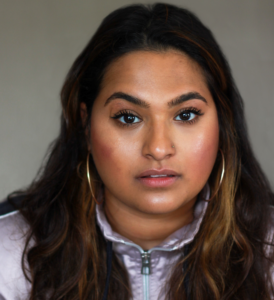IN We Could All Be Perfect, actress Anshula Bain has taken on the mammoth task of playing 15 different characters.
Based on a book by Hannah Morley, the play explores the experiences of girls through history – from the 1800s to an apocalyptic future – and featuring the likes of Joan of Arc, Jane Austen, Malala Yousafzai and Greta Thunberg.
Through a series of largely unrelated scenes, the play highlights the challenges women face in having to be “perfect” for those around them.
“We had to create an identity for each character. Most of them, I’m playing teenage girls, but some of them are men and women, like the parents,” Bain told Eastern Eye.
“It is difficult playing 15 different characters, you really need to work on each one. We worked with the movement director to understand the physicality of each character. We’ve chosen to keep our own voices, but worked on changing intonation and inflection, rather than doing accents.
“Hannah’s writing is so good that you can get a sense of who your character is and then we just built them in the rehearsal room.”
There are scenes of nameless teenage girls over the years, screaming over boybands, practising dance routines, whipping themselves into boarding school deliriums playing LPs backwards, applying make-up, shoplifting cosmetics, agonising over body image, fleeing domestic violence and plotting massacres in their high schools.
In scenes set in the future after an environmental apocalypse, it’s girls who are pulling together to forge a brave new republic. They haven’t yet decided if they’ll let boys be involved.
The show, which has an all-female cast with an almost all-female creative team, highlights the power women and girls have to make a difference on the world around them.
Bain said, “I would have had such a different experience than the other girls in the cast – in terms of class, race, gender, where we grew up – but what we’re exploring in this play is what do different teenage girls look like? What are their stories? What are some of their similarities and differences? And how do they use power when they are given it?
“In one of the scenes I play a teenage girl you might not think is intellectually smart, she didn’t grow up going to museums. When she goes to a museum and she sees lots of pictures of naked women, she grabs a fork and attacks them because she’s so overwhelmed by that feeling of the objectification of women. It’s exploring why she did that.
“We look at the idea that if you give teenage girls permission to use their voice, what happens.
We look Malala Yousafzai, Greta Thunberg, (American civil rights activist) Barbara Johns – all these women who are teenagers and made such an impact on the world,” she said.
For Bain, the play enabled her to reflect on her own teenage years and some of the struggles she went through as a person of south Asian heritage growing up in a predominantly white, middleclass community in St Albans, north of London.
The 29-year-old reveals she was in “survival mode” throughout her childhood because of the racism and other “horrific things” she experienced.
“I didn’t know anyone else around me who was south Asian. There was no one in my friendship group, for example,” she said.

“I faced a lot of racism from primary school and all through secondary school. It was so intense and severe. I found a sense of community and belonging – first through sports and then through drama, even though I was always the only brown girl.”
Bain’s mum is from India and her father is from Mauritius, who settled in St Albans because of his work, which meant the family was distanced from areas with south Asian communities.
Raised as a Catholic, Bain said this meant she didn’t have the opportunity to go to places like temples were Indian families gather.
“It was very hard, because I wasn’t surrounded by a south Asian community growing up and I rejected that community; I rejected being brown because I was told that was wrong from the rest of society that I was with at that time,” she said.
“My teenage years were spent resisting against being south Asian and now my 20s are spent completely embracing every single part of it, the food, the culture, the music – I go see every single Bollywood film.”
None of the characters in We Could All Be Perfect are specifically from a south Asian background – which Bain admits she did question during rehearsals. The idea was that none of the characters have their cultural background explored as the scenes are so short and this also allowed them to be played by an actor.
“I did actually say during rehearsals that I am brown, before I’m a woman. I believe in feminism, but I’m an intersectional feminist. I believe every woman should have a voice, not just one type of woman.”
She added: “It is, however, actually, very refreshing sometimes also to walk into a room and feel like ‘okay, I’am not here because I am of a certain demographic. I’m here because of me’.”
